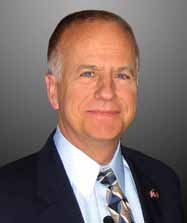Dr. Chris Shoemaker: Question and Answer with ICAR's Newest Advisory Board Member
Dr. Chris Shoemaker: Question and Answer with ICAR's Newest Advisory Board Member
 Dr. Chris Shoemaker is the newest member of the Institute for Conflict Analysis and Resolution (ICAR) Advisory Board. Since 1997, he has served as the Senior Vice President for Strategy at L-3 Communications Services Group and one of its companies, MPRI. Dr. Shoemaker has led MPRI's efforts in developing stable governmental institutions in post-conflict nations. Before entering the private sector, Dr. Shoemaker spent more than 20 years in the US Army, including four years in the White House on the National Security Council staff. Recently, Samantha Levine interviewed Dr. Shoemaker on behalf of ICAR News.
Dr. Chris Shoemaker is the newest member of the Institute for Conflict Analysis and Resolution (ICAR) Advisory Board. Since 1997, he has served as the Senior Vice President for Strategy at L-3 Communications Services Group and one of its companies, MPRI. Dr. Shoemaker has led MPRI's efforts in developing stable governmental institutions in post-conflict nations. Before entering the private sector, Dr. Shoemaker spent more than 20 years in the US Army, including four years in the White House on the National Security Council staff. Recently, Samantha Levine interviewed Dr. Shoemaker on behalf of ICAR News.
Samantha Levine: What unique perspective do you bring to the ICAR Advisory Board?
Chris Shoemaker: The combination of a lifetime of military experience and a decade of experience in the private sector gives me a perspective on the practical side of conflict resolution and how ICAR might make a contribution. Right after the Dayton Accords in 1995, I spent a year in Bosnia to try to bring together, in a working Ministry of Defense, the implacable enemies: the Bosniacs and the Croats. On a daily basis, I had to attempt to adjudicate matters that were seemingly trivial in their dimensions, but were significant in their implications. I was ill-prepared to do that and had to learn on the fly. I had to figure out the kinds of things that ICAR is working on, in a disciplined, structured manner.
Levine: What is the role for conflict resolution in the US military?
Shoemaker: The ability of the US government to bring some practicalities of conflict resolution to Iraq, in light of the three factions, is spotty. Agencies of the government have been unable to step up as vigorously as they should have, so a lot of the responsibility for the up-close-and-personal work of conflict resolution has fallen by default to commanders on the ground. It's not the neatest solution. Soldiers are not trained to do the conflict analysis or resolution that effective programs require. But the military has had to become conversant just because there was nobody else around to do it. It's not a question of what is desirable, but what is reality on the ground right now.
Levine: Where can conflict resolution professionals make the most significant contribution in the fields of post-conflict reconstruction and democratic transitioning?
Shoemaker: To understand the nature of conflicts. That is not by any means easy or obvious. There are often subtleties and culture-specific issues that do not lend themselves to rapid or easy understanding. That must be built into the institutions and the mechanisms for formal or informal conflict resolution. We would rather use these mechanisms than those that come out the barrel of gun.




